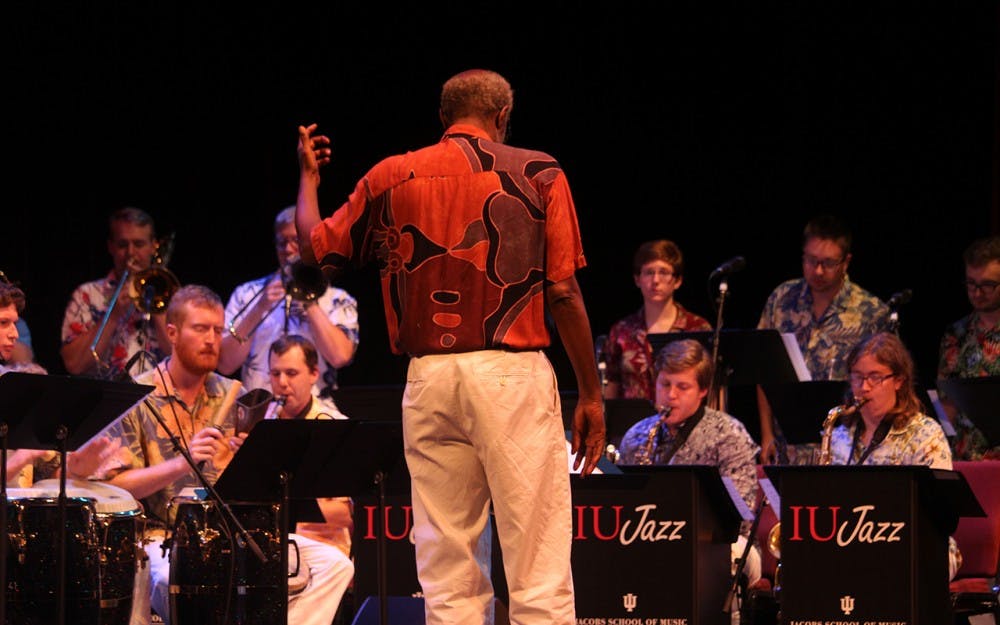Jacobs School of Music students decked themselves out in the tropical attire of floral shirts and white bottoms and shoes when they performed in the Latin Jazz Ensemble on Monday night at the Buskirk-Chumley Theater in Jazz @ the BCT.
The ensemble was directed by the music school’s Michael Spiro, a professor of music and percussion, and Wayne Wallace, a professor of practice in jazz studies and trombone. Both professors are world renowned authorities in the field of Latin jazz, according to the event website.
Wallace said the goal of the ensemble is to give students a practical view into the music industry, especially in the Latin music genre. However, he said that the material often spills over into jazz and funk styles of music as well.
“We give kids the information, whether they’ll be a performer or the instructor of a middle school band,” Wallace said.
Three out of the five pieces presented were composed by Wallace, and the rest were composed by Brian Lynch and Joaquín Betancourt.
This is Wallace’s third year with the Latin Jazz Ensemble, which Spiro founded. According to his profile on the music school’s website, he has been nominated for seven Grammy awards and is one of the world’s most prominent and respected champions of African American-Latin jazz today.
Wallace said the concrete history of jazz’s relationship with Latin music and their concurrent development depends on what one defines as Latin jazz.
“There was an influence from Mexico and the Caribbean to New Orleans,” Wallace said regarding the music’s origin. “The music went up the Mississippi River with Louis Armstrong and Chicago musicians that were migrating as part of the Great Migration from the South after Jim Crow.”
Lucille Berk, a sophomore from Phoenix, Arizona, said admittance to the ensemble is by audition only. She is a clarinet performance and music education major, but she auditioned for and got the part of baritone saxophone.
“This ensemble is a little bit different because it’s a specific genre,” Berk said. “One of the things my band director from Phoenix told me is that there are different types of jazz for everyone.”
Berk said Professor Spiro refers to Latin Jazz as “its own little language,” distinct from any other genres of music.
“There are little gateway jazz drugs,” Berk said. “A lot of popular artists are realizing there is something catchy about older jazz music.”
Senior Eleni Georgiadis, a french horn student, attended the event to support her boyfriend, who played the lead trombone. Even though she does not play jazz, she said she still admires the genre.
“I think jazz is a really creative art form, and there’s so much energy, especially if you watch a live performance,” she said. “It’s amazing how creative these people are.”
According to the Jazz Department’s website, the Jacobs School of Music operated for almost three decades before adding jazz to the official curriculum. Prior to 1959, jazz ensembles in Bloomington functioned as a means of informal entertainment.
Wallace said if composer Leonard Bernstein had not worked with Latin American composers, he would not have been able to write West Side Story with the fluency that he did.
“Jazz is not for the faint of heart, it really requires listening,” Wallace said. “And it nurtures you over time. You might not like certain types of food at the beginning, but as you eat them, you think, ‘Well maybe I don’t like that, but I like this one, so I’ll go back to it.’”




